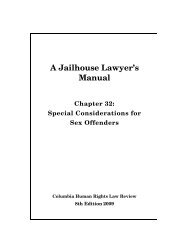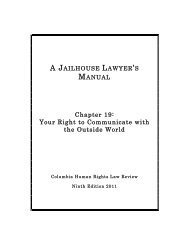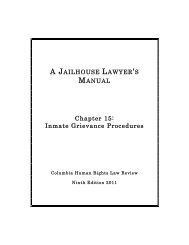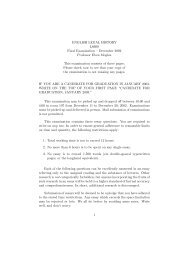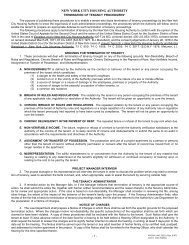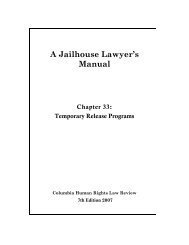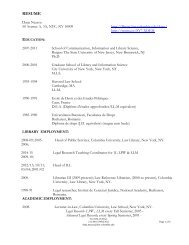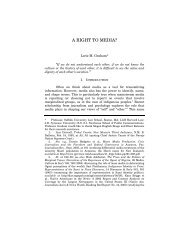The Right to Dignity Rex D. Glensy - Columbia Law School
The Right to Dignity Rex D. Glensy - Columbia Law School
The Right to Dignity Rex D. Glensy - Columbia Law School
Create successful ePaper yourself
Turn your PDF publications into a flip-book with our unique Google optimized e-Paper software.
2011] <strong>The</strong> <strong>Right</strong> <strong>to</strong> <strong>Dignity</strong> 125<br />
First Amendment cases probably present the most nuanced<br />
version of the negative rights approach when it comes <strong>to</strong> the right <strong>to</strong><br />
dignity. 275 <strong>The</strong> Supreme Court seems <strong>to</strong> have agreed with him, noting<br />
that “the right <strong>to</strong> live in human dignity,” which is a basic guarantee<br />
of the Constitution, is a key principle embodied by the First<br />
Amendment. 276 In challenges <strong>to</strong> the freedom of speech, there could be<br />
dual dignity interests at play: that of the speaker and that of the<br />
subject of that speech. That scenario would be especially true where<br />
the First Amendment is asserted as a defense against a defamation<br />
suit. In such circumstances, the negative right, i.e., the proscription<br />
on governmental interference with the dignitary interests of a<br />
speaker, would probably be a tipping point in the analysis, and would<br />
usually favor the speaker. 277 Nevertheless, not all limitations on<br />
speech would trigger a negative analysis of dignitary interests.<br />
Commercial speech, for example, might seem immune from this kind<br />
of framework (although, given the Citizens United 278 case, it is<br />
difficult <strong>to</strong> predict how the Court would construe commercial speech),<br />
but certainly any speech that would relate “<strong>to</strong> the essence of the<br />
individual’s right <strong>to</strong> express . . . herself” would likely involve some<br />
version of “degrading treatment that violates human dignity.” 279<br />
<strong>The</strong>se examples show that the negative treatment of the right<br />
<strong>to</strong> dignity has been present in American law for some time now,<br />
particularly in Supreme Court jurisprudence with respect <strong>to</strong> a host of<br />
different constitutional rights. Thus, possible criticisms levied at<br />
employing the right <strong>to</strong> dignity in this way would differ from those<br />
illustrated above. Such criticisms would probably take the form of<br />
admonishments not <strong>to</strong> add “new rights” <strong>to</strong> the Constitution, or<br />
275. See generally, Ronald Dworkin, Liberty and Pornography, N.Y. Rev. of<br />
Books, Aug. 15, 1991, at 12, 15. (noting, for example, that the freedom <strong>to</strong> publish<br />
pornography may be contradic<strong>to</strong>ry if it results in the silencing of women. “[A]<br />
woman’s speech may be silenced . . . by . . . images that change her audience’s<br />
perceptions of her character . . . and also . . . change her own sense of who she is<br />
and what she wants.”).<br />
276. See N.Y. Times v. Sullivan, 376 U.S. 254, 256 (1964).<br />
277. <strong>The</strong> right <strong>to</strong> abortion also creates scenarios pitting competing<br />
dignitary interests. Here, it is less certain which side of the equation the right <strong>to</strong><br />
dignity is more likely <strong>to</strong> help. See, e.g., Gonzales v. Carhart, 550 U.S. 124, 157<br />
(2007) (dignity interests curtailed the rights of others in the prohibition of certain<br />
lateterm abortion procedures deemed constitutional partially out of “respect for<br />
the dignity of human life.”).<br />
278. Citizens United v. Fed. Election Comm., 130 S.Ct. 876 (2010).<br />
279. David Kretzmer, Human <strong>Dignity</strong> in Israeli Jurisprudence, in D.<br />
Kretzmer & E. Klein, <strong>The</strong> concept of Human <strong>Dignity</strong> in Human <strong>Right</strong>s Discourse<br />
161, 174 (2002).



